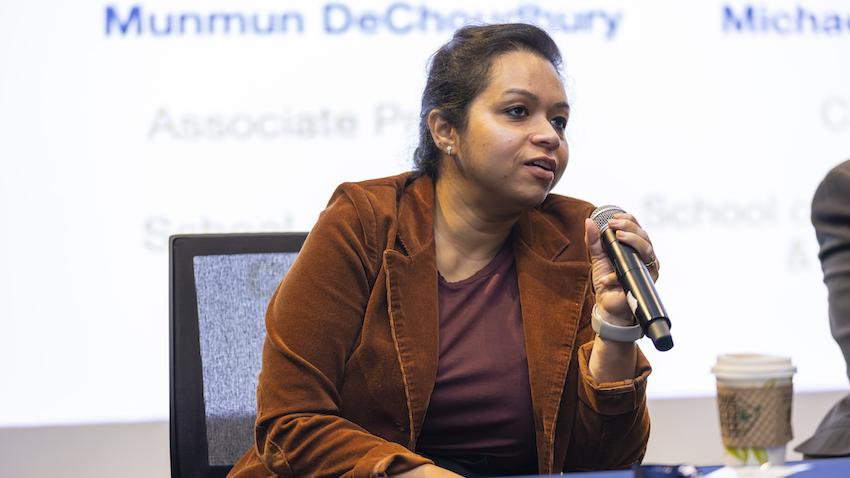
Researcher to Advise WHO on Addressing Loneliness and Social Isolation
The World Health Organization (WHO) has launched a new initiative to raise global awareness of loneliness and social isolation and to reduce their impact.
To stay informed by global experts as it plans potential policies on the subject, the WHO has created the Technical Advisory Group on Social Connection (TAG-SC). The 20-member committee will serve as an advisory body to guide the WHO on how it can increase political visibility, measure the extent of the problem, and identify effective interventions.
Munmun De Choudhury, an associate professor in the School of Interactive Computing, is one of three U.S. experts on the internationally diverse committee.
De Choudhury is renowned for her research on the role of social media and how it shapes and influences mental health. She will serve a two-year term on the advisory group, providing insight to the TAG-SC on how social media and other technologies can affect loneliness and social connection.
“TAGs are the highest level of technical advisors at WHO and are noted to wield significant power as an independent body in shaping evidence-based policies and reforms on issues threatening global health,” De Choudhury said.
“My involvement will center around how social media use relates to mental health and well-being outcomes, spanning varied populations, platforms, and cultural contexts, including the Global North and the Global South.”
The advisory group’s findings will be part of a report that the WHO shares with its member states and partners. The report could guide relevant discussions within the United Nations General Assembly.
“We’re thinking about this question on a global stage, and an organization like WHO can help make this a global focus,” she said. “It’s an issue that is of significance everywhere in the world.”
The WHO estimates that loneliness and social isolation can increase the risk of mortality by 14-32%, which is on par with other well-known risk factors such as smoking and excessive drinking. The Covid-19 pandemic has exacerbated the problem.
“The harmful effects of loneliness are not just harmful mentally, but there are physical health aspects,” De Choudhury said. “Studies have shown that people who felt lonely have shorter life spans than those who felt supported.
“There is an increased risk of things like cardiovascular disease or stroke, and suicide rates are also higher. To ensure our society wants to feel good and healthy, we must tackle this as a problem.”
The TAG-SC will advise the Secretariat of the WHO Commission on Social Connection, which comprises two co-chairs and nine commissioners tasked with making the harms of social isolation and loneliness a global health priority.
De Choudhury said the first step for TAG-SC is to measure the global impact of loneliness. They will do this by developing culturally aware measurement tools to assess the problem in different parts of the world. The process will inform any research, data collection initiatives, or interventions WHO may recommend.
“To take on this challenge, we must figure out the extent of the problem,” she said. “Before we can collect any data or identify potential mitigation strategies, we need to know what we should be measuring, and that’s where this committee plays a role.”
This recognition is the second major committee appointment De Choudhury has received in the last two years. She recently advised the National Academies of Sciences, Engineering, and Medicine (NASEM) on a 250-page report in December detailing social media’s impact on the health of adolescents and children.
Top photo by Terence Rushin/College of Computing.
As computing revolutionizes research in science and engineering disciplines and drives industry innovation, Georgia Tech leads the way, ranking as a top-tier destination for undergraduate computer science (CS) education. Read more about the college's commitment:… https://t.co/9e5udNwuuD pic.twitter.com/MZ6KU9gpF3
— Georgia Tech Computing (@gtcomputing) September 24, 2024


